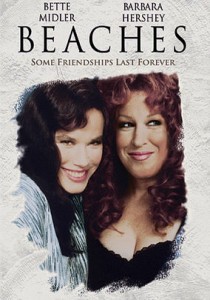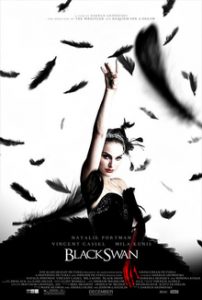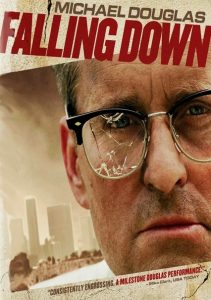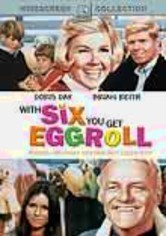Beaches-1988
Director Garry Marshall
Starring Bette Midler, Barbara Hershey
Top 250 Films #162
Scott’s Review #352
Reviewed January 9, 2016
Grade: A
Beaches (1988) is a film that can easily be described as sentimental, sappy, and a chick flick- all in a derogatory fashion- but that regardless, is a treasure to me. I fall for this tearjerker every single time that I watch it.
It is not necessarily a great film, not high art, nor particularly edgy, but a good, old-fashioned, conventional film about friendship.
Bette Midler and Barbara Hershey give the film believability whereas other similar films would appear contrived.
C.C. Bloom (Midler) and Hillary Whitney (Hershey) are lifelong friends from opposite backgrounds. Besides, they could not have more opposite personalities. C.C. is blue-collar, outrageous, and brash, Hillary, is demure, rich, and sophisticated.
We meet our friends as young girls on the boardwalk of Atlantic City, C.C. hiding from her overbearing stage Mom, and Hillary lost and wandering the boardwalk.
The two become fast friends despite their vastly different upbringings and stay connected through ups and downs and life’s trials and tribulations, for over thirty years.
The chemistry between Midler and Hershey is great. I completely buy them as best friends through the years, despite having little in common.
Throughout their tender, emotional scenes, and the knock-down-drag-out fight they have at the mall (a fantastic scene!), there is never doubt about what they have.
They compete over a man, which ordinarily is a lame plot device, but in Beaches, it works because the two stars make it work.
Each actress puts her mark on the individual role. Midler’s C.C. is arrogant, feisty, and interesting as she begins a “have not” and becomes a “have”.
She becomes spoiled and pampered- all of the things she envies about Hillary. She does not handle wealth as well as Hillary because she lacks education. Hillary, an attorney, is classy and graceful.
These characteristics are why it is believable that the women would be at odds.
The last act is a weepy one as one of the women dies, leaving the other to pick up the pieces and move on- alone. This is a sad moment in the film, but the women’s devotion and loyalty are admirable.
Beaches (1988) may not be high art, but boy will it get you reaching for the tissues.
Oscar Nominations: Best Art Direction



